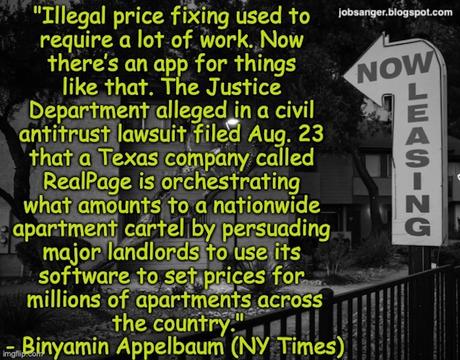
The following post is part of an article in The New York Times by Binyamin Applebaum:
Illegal price fixing used to require a lot of work. . . .
Now there’s an app for things like that.
The Justice Department alleged in a civil antitrust lawsuit filed Aug. 23 that a Texas company called RealPage is orchestrating what amounts to a nationwide apartment cartel by persuading major landlords to use its software to set prices for millions of apartments across the country. RealPage markets its software by boasting that it increases rents by 3 percent to 7 percent.
The case is important because it highlights the growing use of algorithms to set prices — and the potential for companies that are supposed to be competing to instead coordinate at the expense of their customers by using the same price-setting formulas. The suit is part of a broader effort by the nation’s antitrust enforcers to catch up with the methods that modern corporations are using to squeeze their customers — in this case, by increasing the price of housing, the most expensive part of American life.
“We are seeing these kinds of technologies emerge throughout our economy,” Jonathan Kanter, the assistant attorney general for antitrust, said in an interview. Technology, he said, “took something that may have been inherently difficult to do, in terms of putting a cartel together, and actually is making it much easier and more effective.”. . .
What the team found, the government says, is that RealPage calculates target prices for individual apartments by using proprietary data from its clients and then urges clients to use those prices by arguing that if everyone cooperates, everyone wins.
The complaint quotes a RealPage executive explaining, “There is greater good in everybody succeeding versus essentially trying to compete against one another in a way that actually keeps the entire industry down.” This may be true, insofar as one is interested in the greater good of landlords. Society as a whole, however, benefits more when companies are forced to participate in vigorous competition. Their pain is our gain. In the apartment business, that means rents would rise more slowly — or even go down. . . .
RealPage can orchestrate pricing because the ownership of large apartment buildings in major markets is increasingly dominated by the same handful of big national landlords. . . .
RealPage’s success, built on the market dominance of the biggest landlords, should be regarded as evidence that they have accumulated too much power. Ending algorithmic price fixing is a necessary first step to check that power.

